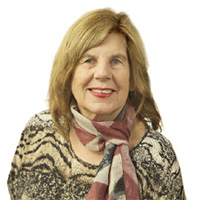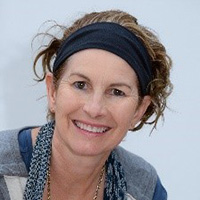Margo Lockhart and Susan Long
1-day Professional Development Workshop, PDW6
This professional development workshop will explore social defences and complex dynamics (conscious and unconscious) surrounding conversations about the treatment of animals and meat eating. There are many walls on the issue: between meat eaters and vegetarians; farmers and urban dwellers; and humans and animals. Food is a contentious issue that divides us: what’s ethical or unethical; healthy or unhealthy; eco-friendly or unsustainable. This topic can give insight also into the dynamics surrounding difficult conversations in many “wicked problem’ areas.
The Issue: A System with Walls
The practice that dominates our food system is industrialised animal agriculture or factory farming. Global research conducted by the Sentience Institute suggests over 90 percent of farmed animals worldwide live on factory farms (Gilliver, 2019). Billions of animals around the world live in industrial complexes with no sunlight, fresh air, or room to move. The walls around them are virtually prison walls.
Widespread polarising occurs between people about the practice of eating animals. Veganism is one of the fastest growing movements in the world today, however there is much backlash against ‘extremists’. Our instinct towards binary thinking creates labelling at both ends of the dinner conversation with farmers perceived as heartless and money-hungry and animal activists labelled “green collared criminals” (Stubley, 2019, p13).
Getting Beyond Individual and Social Defences
Sociologist Melanie Joy (2010) coined the term “Carnism” to describe the invisible system and dominant ideology which encourages us to eat certain animals. Carnism sustains itself through invisibility (we don’t see the factory farms), denial and dissociation (we eat ‘meat’, not animals), and myths (agricultural advertising uses countless pictures of animals looking happy on ‘real’ farms).
Steiner (1999) also examines invisibility and denial in his exploration of the phenomenon “turning a blind eye” (p86), where we have access to adequate knowledge but because it is so unpleasant and disconcerting we choose unconsciously, and sometimes consciously, to ignore it. Long (2015) explores the collective blind eye regarding climate change: ‘Denial becomes a systemic process that can shape a whole culture, and therein lies its most insidious harm’ (p 248). Long argues that socio-analysis offers the possibility of facing such “wicked problems”, through the multiple perspectives available in this field of work.
Rather than sustaining defences and associated unconscious guilt (cf. the unconscious guilt involved in racism (Davids 2011)), how might we work through the issues?
This workshop aims to use the multiple perspectives offered through ISPSO to stimulate new ways of thinking about the walls around the dinner conversation. The workshop will include small and large group discussions, a short field trip, creative drawing and individual reflection time to enable expression of and insights into thoughts and feelings on the issue of eating animals.
Intended learning outcomes:
- Increased awareness of the dynamics of “collective blindness”. While this is a general issue in systems psychodynamics the specific focus is on the issue of cruelty towards animals
- Increased awareness of the ways psychological walls are created between people and how they might be examined and reduced
- Examination of the difficulties in awareness and conversation about the global treatment of animals
- Individual reflection on one’s own attitude, thoughts, defences, and behaviour towards the eating of animals
- Exploration of potential ways forward on this complex issue while avoiding intergroup blame and unconscious guilt.
Participants will be asked to bring a list of meals they have had over the previous week with brief notes on why they chose those meals as a basis for discussion.

Susan Long is a Melbourne based organisational consultant and executive coach. Previously Professor of Creative and Sustainable Organisation at RMIT University, she is now Director of Research and Scholarship at the National Institute for Organisation Dynamics Australia (NIODA). She is an associate of the University of Melbourne Executive Programs and teaches at INSEAD in Singapore and the University of Divinity in Melbourne. She has consulted to organisational change in the health and justice sectors and coached senior executives across many sectors. She has worked with executives from many different nationalities and from diverse industries, having taught or consulted in the UK, the USA, Ireland, the Netherlands, Germany, Russia, Israel, Thailand and Singapore. Susan has been in a leadership position in many professional organisations: President of the PSAA (2010-2015), past president of ISPSO (the International Society for the Psychoanalytic Study of Organizations), Inaugural President of Group Relations Australia, and President of the Gordon Lawrence Foundation. She has published ten books and is General Editor of the journal Socioanalysis and Associate Editor with Organisational and Social Dynamics.

Margo Lockhart is a highly regarded facilitator, designer and coach with a deserved reputation for developing trust and rapport in the working environment. With an academic background in education, counselling and organisational dynamics, Margo brings a disciplined and reflective focus to her work. She has extensive experience in program design, implementation and presentation in a very diverse range of organisations. Margo regularly facilitates management and leadership programs, as well as courses in Emotional Intelligence, Team Dynamics and Influencing Skills. She is an experienced board director, having spent 10 years on the boards of various environmental groups. Margo has worked in a wide variety of industry sectors including Education, Government Departments, Local Government, Retail, Telecommunications, Financial Services, Mining, and many Not-for-Profit organisations. Margo’s work in leadership development has involved both establishing and managing an in-house coaching program involving 80 managers at two different levels at AXA Australia, and facilitating the BHP Billiton Graduate Program through the Melbourne Business School.